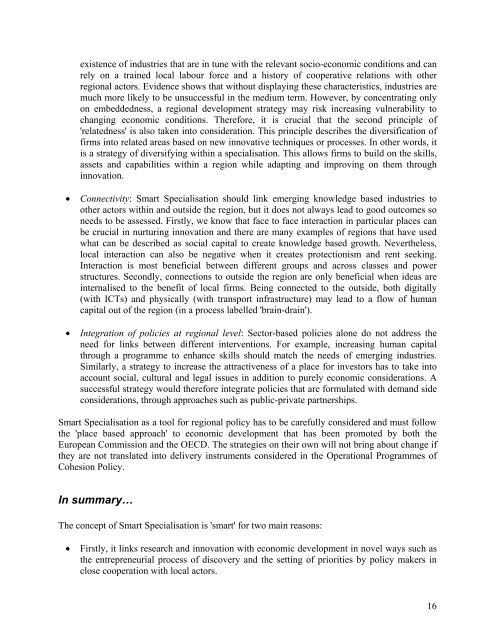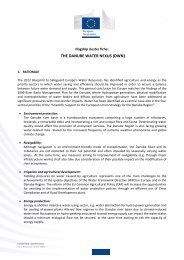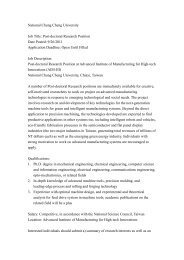Guide to Research and Innovation Strategies for Smart Specialisation
Guide to Research and Innovation Strategies for Smart Specialisation
Guide to Research and Innovation Strategies for Smart Specialisation
Create successful ePaper yourself
Turn your PDF publications into a flip-book with our unique Google optimized e-Paper software.
existence of industries that are in tune with the relevant socio-economic conditions <strong>and</strong> can<br />
rely on a trained local labour <strong>for</strong>ce <strong>and</strong> a his<strong>to</strong>ry of cooperative relations with other<br />
regional ac<strong>to</strong>rs. Evidence shows that without displaying these characteristics, industries are<br />
much more likely <strong>to</strong> be unsuccessful in the medium term. However, by concentrating only<br />
on embeddedness, a regional development strategy may risk increasing vulnerability <strong>to</strong><br />
changing economic conditions. There<strong>for</strong>e, it is crucial that the second principle of<br />
'relatedness' is also taken in<strong>to</strong> consideration. This principle describes the diversification of<br />
firms in<strong>to</strong> related areas based on new innovative techniques or processes. In other words, it<br />
is a strategy of diversifying within a specialisation. This allows firms <strong>to</strong> build on the skills,<br />
assets <strong>and</strong> capabilities within a region while adapting <strong>and</strong> improving on them through<br />
innovation.<br />
• Connectivity: <strong>Smart</strong> <strong>Specialisation</strong> should link emerging knowledge based industries <strong>to</strong><br />
other ac<strong>to</strong>rs within <strong>and</strong> outside the region, but it does not always lead <strong>to</strong> good outcomes so<br />
needs <strong>to</strong> be assessed. Firstly, we know that face <strong>to</strong> face interaction in particular places can<br />
be crucial in nurturing innovation <strong>and</strong> there are many examples of regions that have used<br />
what can be described as social capital <strong>to</strong> create knowledge based growth. Nevertheless,<br />
local interaction can also be negative when it creates protectionism <strong>and</strong> rent seeking.<br />
Interaction is most beneficial between different groups <strong>and</strong> across classes <strong>and</strong> power<br />
structures. Secondly, connections <strong>to</strong> outside the region are only beneficial when ideas are<br />
internalised <strong>to</strong> the benefit of local firms. Being connected <strong>to</strong> the outside, both digitally<br />
(with ICTs) <strong>and</strong> physically (with transport infrastructure) may lead <strong>to</strong> a flow of human<br />
capital out of the region (in a process labelled 'brain-drain').<br />
• Integration of policies at regional level: Sec<strong>to</strong>r-based policies alone do not address the<br />
need <strong>for</strong> links between different interventions. For example, increasing human capital<br />
through a programme <strong>to</strong> enhance skills should match the needs of emerging industries.<br />
Similarly, a strategy <strong>to</strong> increase the attractiveness of a place <strong>for</strong> inves<strong>to</strong>rs has <strong>to</strong> take in<strong>to</strong><br />
account social, cultural <strong>and</strong> legal issues in addition <strong>to</strong> purely economic considerations. A<br />
successful strategy would there<strong>for</strong>e integrate policies that are <strong>for</strong>mulated with dem<strong>and</strong> side<br />
considerations, through approaches such as public-private partnerships.<br />
<strong>Smart</strong> <strong>Specialisation</strong> as a <strong>to</strong>ol <strong>for</strong> regional policy has <strong>to</strong> be carefully considered <strong>and</strong> must follow<br />
the 'place based approach' <strong>to</strong> economic development that has been promoted by both the<br />
European Commission <strong>and</strong> the OECD. The strategies on their own will not bring about change if<br />
they are not translated in<strong>to</strong> delivery instruments considered in the Operational Programmes of<br />
Cohesion Policy.<br />
In summary…<br />
The concept of <strong>Smart</strong> <strong>Specialisation</strong> is 'smart' <strong>for</strong> two main reasons:<br />
• Firstly, it links research <strong>and</strong> innovation with economic development in novel ways such as<br />
the entrepreneurial process of discovery <strong>and</strong> the setting of priorities by policy makers in<br />
close cooperation with local ac<strong>to</strong>rs.<br />
16

















